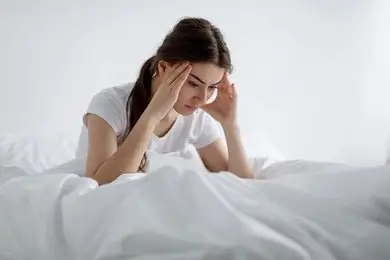Do you ever feel like you’re doing everything right—from winding down before bed to skipping late-night caffeine—but still find yourself staring at the ceiling at 2 a.m.? 😴 You’re not alone, lovely. For many women, the secret to restful, nourishing sleep lies deeper than habits—it’s all about hormonal balance. 💖
Our bodies are beautifully complex, and hormones like melatonin, cortisol, estrogen, and progesterone play a huge role in how well we sleep. When these messengers are out of sync, your nights can become restless and your days, well… exhausting. 😩
The good news? You can reclaim your sleep naturally by supporting your body’s hormone health—no harsh medications or one-size-fits-all fixes needed. 🌿✨ In this guide, we’ll explore how to balance your hormones gently and naturally so you can wake up feeling refreshed, energized, and fully you again.
- 💤 The Connection Between Sleep and Hormones 💕
- 🌸 Key Hormones That Influence Your Sleep 🌙
- 🔍 Chapter 3: Signs Your Hormones May Be Disrupting Your Sleep 💤
- 🌿 Natural Ways to Balance Hormones for Better Sleep ✨
- 🌺 Chapter 5: Long-Term Sleep Strategies for Hormonal Health 🛌
- 🌸 Conclusion: It’s Time to Reclaim Your Rest 💖
- 📚 Recommended Readings and Expert Advice
- 🔗 Sources
💤 The Connection Between Sleep and Hormones 💕
Let’s talk girl-to-girl—have you ever felt like your sleep patterns have a mind of their own? One week you’re out like a light 😴, and the next, you’re tossing and turning at 3 a.m., wondering why your brain won’t shut off. The culprit might not be your mattress, your phone, or your late-night snack. More often than not, it’s your hormones. 🧬✨
🌙 Hormones: Your Body’s Inner Sleep Messengers
Hormones are like little text messages your body sends to keep everything in sync 📲—and sleep is one of their favorite topics. Two of the most important messengers when it comes to sleep are:
- Melatonin: Known as the sleep hormone, melatonin tells your body it’s time to wind down. It’s released when the sun goes down 🌇 and helps you drift off peacefully.
- Cortisol: Often called the stress hormone, cortisol should naturally lower at night. But when it’s too high (hello, overthinking and stress! 😵💫), it can keep you wired and wide-eyed.
When these two hormones fall out of rhythm, your sleep-wake cycle—also known as your circadian rhythm—starts to suffer. That’s when you end up feeling groggy, moody, or wired at the worst times. 😫
💗 Hormonal Changes = Sleep Changes
Hormonal shifts during your menstrual cycle, pregnancy, perimenopause, or menopause can throw your sleep completely off balance. Sound familiar?
- Before your period, progesterone dips 😔—which can lead to restless nights.
- During pregnancy, higher estrogen can cause night sweats, vivid dreams, and discomfort. 🤰💦
- And menopause? Hot flashes and cortisol spikes can make you feel like you’ve completely forgotten what “rested” even means. 😵🔥
These aren’t just random changes—they’re your body’s way of signaling that it needs a little extra care and attention.
🧘♀️ It’s Not Just in Your Head—It’s in Your Hormones
If you’ve ever felt guilty for not sleeping well even though you’re “doing everything right,” take a deep breath, sis. 🌬️💗 It’s not your fault—and you’re not alone. Hormones are powerful, but the great news is: with a few gentle, natural tweaks, you can help them work with you, not against you. 🌿💪
🌸 Key Hormones That Influence Your Sleep 🌙
Okay beautiful, let’s dive deeper into the amazing world of hormones 🧬—specifically, the ones that have the biggest say in whether you get that dreamy, deep sleep you deserve. 😴💕
Understanding these key players will help you tune in to what your body really needs, especially during those restless nights and foggy mornings. Ready? Let’s meet your hormonal dream team! 💫
🌜 Melatonin: The Sleep Queen
Melatonin is your body’s natural sleep hormone—and she is essential. 👑 Produced by the pineal gland in your brain, melatonin levels rise when it gets dark 🌌, helping your body relax and signaling that it’s time to rest.
💡 But here’s the catch: Blue light from screens 📱, caffeine ☕, and even stress can block melatonin production. That’s why scrolling TikTok in bed or watching Netflix late at night can sabotage your sleep.
✨ Quick tip: Start dimming the lights an hour before bed, and consider using a soft amber night light or blue light-blocking glasses to support melatonin naturally. 🧡
🔥 Cortisol: The Stress Boss
Cortisol gets a bad rap, but she’s not all bad. 💁♀️ Known as the “stress hormone,” cortisol helps you wake up, stay alert, and respond to challenges. But when she’s too high—especially at night—she can be a total sleep wrecker. 🥴
🧠 Chronic stress, late-night anxiety, or even overexercising can cause cortisol levels to spike at the worst time, keeping your body in “go-go-go” mode when it should be winding down. 😩
✨ Quick tip: Try deep breathing, journaling 📝, or a calming tea like chamomile 🌼 in the evening to gently tell cortisol it’s okay to chill.
💖 Estrogen & Progesterone: The Feminine Duo
Ladies, this hormonal duo is especially close to our hearts (and our sleep cycles). 🫶
- Estrogen helps regulate body temperature 🌡️ and supports deep sleep. But when levels dip—like during perimenopause or after ovulation—night sweats and restlessness can kick in. 🥵
- Progesterone is your natural calming agent, often called nature’s “anti-anxiety” hormone. It boosts GABA, a brain chemical that helps you relax. When progesterone is low (like before your period or during menopause), anxiety and insomnia can spike. 😟
✨ Quick tip: Foods rich in vitamin B6 (like bananas 🍌, salmon 🐟, and leafy greens 🥬) support progesterone, while flax seeds, soy, and chickpeas may help balance estrogen.
Understanding your hormones is like having a behind-the-scenes look at what your body’s been trying to tell you all along. 📖💗 And the best part? Once you know how these beautiful messengers work, you can start supporting them naturally—and sleep like the goddess you are. 👑🌙
Up next, we’ll talk about how to spot the signs that your hormones might be stealing your sleep… 👀💤
🔍 Chapter 3: Signs Your Hormones May Be Disrupting Your Sleep 💤
Let’s be real for a second, lovely—you know your body better than anyone. 💖 You notice when something feels “off,” even if you can’t quite explain it. If your sleep has been feeling broken, unpredictable, or just not as restorative as it used to be, your hormones could be whispering (or screaming!) for attention. 😫📉
Here are some gentle signs that your sleep struggles might actually be hormonal—and that it’s time to tune in, not tough it out. 💌
⏰ Trouble Falling or Staying Asleep
You finally get into bed, close your eyes… and nothing. 😵 Your mind races, your body feels wired, or you keep waking up throughout the night—especially around 3–4 a.m. Sound familiar?
💡 Possible culprit: High nighttime cortisol. Stress hormones are meant to be low at night, but if they spike instead, they can make sleep feel impossible—even when you’re exhausted. 😮💨
🌥️ Waking Up Tired, No Matter How Long You Sleep

If you’re logging 7–9 hours but still dragging yourself out of bed like a sleep-deprived zombie 🧟♀️, something deeper might be going on.
💡 Possible culprit: Low melatonin, poor sleep quality, or imbalances in estrogen or progesterone—especially common during PMS, perimenopause, and postpartum stages. 🩸
💭 Mood Swings, Brain Fog, and Anxiety
Hormonal sleep issues aren’t just about feeling tired. They often come with a messy bundle of emotional and mental symptoms, too—hello brain fog, irritability, anxiety, and those unexpected crying spells. 😢🌀
💡 Possible culprit: Fluctuating progesterone or estrogen, especially in the second half of your cycle. These shifts can leave your nervous system more sensitive and sleep less stable.
🔥 Hot Flashes or Night Sweats
Waking up drenched in sweat—or feeling like your bed suddenly turned into a sauna? 🥵 You’re not crazy, love. These common symptoms, especially in perimenopause or menopause, can drastically impact your sleep.
💡 Possible culprit: Dropping estrogen levels, which affect your body’s internal thermostat and can trigger nighttime overheating. 💦🛌
Remember, your body is never trying to work against you—it’s just doing its best with the tools it has. 🛠️ These symptoms are your body’s gentle nudge (okay, sometimes not-so-gentle 😅) asking for a little extra care and balance.
And the good news? In the next chapter, we’ll talk about how to naturally support your hormones and get your sleep back on track—without any harsh meds or complicated routines. 🌿💤✨
🌿 Natural Ways to Balance Hormones for Better Sleep ✨
Okay lovely, now that we’ve uncovered what might be stealing your sleep (👀 hormones, we’re lookin’ at you!), let’s talk about how to gently restore your balance—naturally, intentionally, and without overwhelm. 🧘♀️💗
No quick fixes or crash plans here—just simple, beautiful habits that support your body’s natural rhythm so you can sleep deeper, longer, and wake up feeling more like you. 💫💤
🥗 Nourish Your Hormones with Sleep-Supportive Foods
Your body loves being nourished—and what you eat plays a powerful role in balancing hormones. Let’s feed those sleepytime messengers right. 🍽️💕
- Tryptophan-rich foods like turkey 🦃, oats, and bananas 🍌 help boost serotonin, which converts into melatonin (yes, that magical sleep hormone 🌙).
- Magnesium-rich goodies like dark leafy greens 🥬, pumpkin seeds 🎃, and avocado 🥑 help calm the nervous system and reduce cortisol.
- Healthy fats from foods like salmon 🐟, olive oil, and chia seeds support the production of estrogen and progesterone. 🩷
✨ Gentle tip: Try a small, hormone-happy snack an hour before bed—like almond butter on whole grain toast or warm oat milk with cinnamon. 😋
🌅 Reset Your Circadian Rhythm Naturally
Your internal clock—aka your circadian rhythm—needs clear signals to know when to sleep and when to rise. Here’s how to give it a gentle nudge. 🕰️☀️
- Get morning sunlight within the first hour of waking 🌞 (even 10 minutes helps kickstart your melatonin cycle for the night ahead).
- Avoid bright lights and screens at least an hour before bed 📵—blue light tells your brain it’s still daytime, delaying melatonin.
- Stick to a sleep schedule (yes, even on weekends!) to keep your hormones in rhythm. ⏰
✨ Gentle tip: Try setting a “wind-down alarm” 🛎️—a reminder to start your evening routine and signal your body it’s time to rest.
🌸 Lean Into Gentle Supplements and Herbal Support
Nature has gifted us some beautiful helpers to support our sleep and hormone balance. 🌿💊 Just be sure to check with a healthcare provider before starting anything new!
- Magnesium glycinate: Soothes the nervous system and promotes deeper sleep 😴
- Adaptogens like ashwagandha and rhodiola: Help regulate cortisol and ease stress 🤍
- Herbal teas: Think chamomile, lavender, lemon balm, or passionflower for a calming nighttime ritual 🍵🌼
✨ Gentle tip: Create a tea ritual you actually look forward to—a moment of stillness to close the day, just for you. 💕
Small, loving shifts in your daily rhythm can make a huge difference, sis. ✨ Your hormones respond beautifully to consistency, calm, and care—and the better they feel, the better you’ll sleep. 💗😌
Ready to turn these changes into lasting habits and create your own sleep sanctuary? 🕯️💤 Let’s wrap up with long-term strategies that nurture hormonal health and restful nights… for the long run. 🌙💞
🌺 Chapter 5: Long-Term Sleep Strategies for Hormonal Health 🛌
You’ve learned so much about your hormones, beautiful—and now it’s time to bring all that wisdom into your real life in ways that feel doable, supportive, and oh-so-aligned with your feminine flow. 💃🌿
Long-term hormone balance isn’t about perfection—it’s about consistency, kindness to yourself, and creating rhythms that your body can trust. Let’s look at how to set yourself up for lasting sleep wellness. 💫💕
🛏️ Build a Bedtime Routine Your Body Loves
Think of your bedtime as a little sacred ritual—not a chore. 🌙✨ Your hormones crave predictability, and giving your body clear signals that it’s time to wind down is one of the most powerful ways to support melatonin and calm cortisol.
Here’s a dreamy nighttime routine to try:
- 📖 Read something calming (no murder mysteries, babe 😅)
- 🛁 Take a warm bath with magnesium salts or lavender oil
- 🍵 Sip on a calming tea
- 🧘♀️ Do a short meditation, deep breathing, or journaling
✨ Gentle tip: Try going to bed and waking up at the same time every day—even weekends. It keeps your hormones in sync and makes falling asleep feel effortless.
📱 Embrace Sleep-Supportive Tech & Tools
Yes, screens can mess with melatonin… but some tech can be your ally when used with intention. 💻📿
- Sleep apps like Calm, Insight Timer, or Headspace offer guided meditations, sleep stories, and breathing exercises that help you wind down. 🎧🌌
- Sleep trackers (like Fitbit or Oura) can give insights into your sleep patterns—great for spotting trends in how stress or hormones affect your rest. 📊
✨ Gentle tip: Use sleep data as information, not judgment. This is about curiosity, not control. 💗
🩺 When to Get Professional Support
Sometimes, no matter how well we eat, how early we unplug, or how many herbal teas we sip—sleep still feels hard. And that’s okay. 🫶
Here’s when it might be time to reach out to a practitioner:
- You’ve tried natural changes for several weeks with little to no improvement
- You suspect thyroid issues, PCOS, or perimenopause may be involved
- You’re experiencing intense anxiety, night sweats, or mood swings that affect your daily life
✨ Gentle reminder: Seeking support isn’t a weakness—it’s wisdom. Hormonal testing or working with a functional medicine doctor can be a game-changer. 🙌💖
Sweet soul, your body is not broken—it’s communicating. When you listen with love, respond with care, and create space for rest and rhythm, your hormones will begin to thank you in the most beautiful way: peaceful, restorative sleep. 🌜🕊️
Here’s to soft nights, steady energy, and a deeper connection to the natural wisdom inside you. You deserve to feel rested, radiant, and fully you. 💕
🌸 Conclusion: It’s Time to Reclaim Your Rest 💖
Beautiful soul, if you’ve made it this far—thank you for showing up for yourself. 🤍 So many women silently struggle with poor sleep, blaming themselves or brushing it off as “normal.” But here’s the truth: your rest matters. You matter. And you deserve sleep that leaves you feeling nourished, restored, and deeply at peace. 😌💤
Balancing your hormones naturally isn’t about being perfect or overhauling your whole life. It’s about tuning in, making gentle shifts, and honoring your body’s signals with compassion and care. 🌿✨
Let this post be your reminder that restful nights and energized mornings aren’t out of reach. They’re within you—waiting for you to come home to your rhythm. 🌙💕
💌 Your Next Step:
- Start with just one change this week—maybe it’s a calming tea before bed, more morning sunlight, or dimming the lights earlier. ✨
- Journal how you feel over the next few days—emotionally, physically, and mentally. 📓🖊️
- Be patient with yourself. Hormonal balance takes time, but every small step is a beautiful investment in you. 💗
If this post spoke to your heart, share it with another sister who might be struggling in silence. Together, let’s normalize deep sleep, hormone health, and self-love. 💕
📚 Recommended Readings and Expert Advice
If you’re ready to dive deeper into balancing hormones and improving your sleep, here are a few carefully selected resources that will guide you on your journey. These experts and books have valuable insights to offer, from the science behind hormonal health to holistic sleep practices. 💖
Books:
- “The Sleep Revolution” by Arianna Huffington
A must-read for understanding the importance of sleep in our lives and the deep connection between sleep and wellness. 🌙📚 - “The Hormone Cure” by Dr. Sara Gottfried
This book provides natural remedies and strategies to help women balance their hormones through diet, supplements, and lifestyle changes. 🍓🧘♀️ - “The Female Brain” by Louann Brizendine, M.D.
This one is perfect for understanding how the female brain changes throughout the lifespan—and how those changes affect sleep, mood, and energy. 🧠💕
Articles & Expert Insights:
- Dr. Aviva Romm – Hormone Health for Women
Dr. Romm is an expert in functional medicine, and her advice on hormone balance is both insightful and practical. Check out her website for helpful articles and tips. 🩺🌱
Read More Here - The National Sleep Foundation
Their research-based resources on sleep disorders, hormonal impacts on sleep, and tips for better sleep hygiene are top-notch. 💤🔬
Visit Their Website - The Hormone Health Network
The Hormone Health Network is a trusted source for understanding how hormonal changes (like perimenopause, menopause, and more) affect sleep—and how you can find support. 🌿
Learn More Here
🔗 Sources
Here are the research-backed resources and scientific studies that helped shape this post. Dive into these articles to get even more insight into the relationship between hormones and sleep.
- Melatonin and the Circadian Rhythm – National Institutes of Health
Read the Study
A deep dive into the role of melatonin in regulating sleep and the circadian rhythm. 🧬 - Cortisol and Sleep Disorders – The Sleep Health Foundation
Read the Study
A comprehensive look at how cortisol affects sleep quality and how to manage it. 🧠 - Estrogen’s Role in Sleep and Menopause – Mayo Clinic
Learn More
Insight into how estrogen fluctuations, especially during menopause, can impact sleep and how to manage symptoms naturally. 🔬 - Progesterone and Sleep – National Institutes of Health
Explore the Research
How progesterone contributes to sleep quality and why a lack of it might cause insomnia. 💤 - Adaptogens for Hormonal Balance – National Center for Complementary and Integrative Health
Discover More Here
A look at adaptogens like ashwagandha and rhodiola and their potential to support hormonal balance and reduce stress. 🌿


